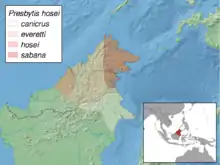Sabah grizzled langur
The Sabah grizzled langur (Presbytis sabana), also known as the Saban grizzled langur, is a species of monkey in the family Cercopithecidae. It was formerly considered a subspecies of Hose's langur, Presbytis hosei (as Presbytis hosei sabana).[2][3][4] The Sabah grizzled langur is native to the island of Borneo in the province of Sabah in Malaysia, with part of its range in Indonesia.[1][4] It is listed as endangered by the IUCN due primarily to habitat loss, fragmentation and hunting.[1]
| Sabah grizzled langur | |
|---|---|
| Scientific classification | |
| Domain: | Eukaryota |
| Kingdom: | Animalia |
| Phylum: | Chordata |
| Class: | Mammalia |
| Order: | Primates |
| Suborder: | Haplorhini |
| Infraorder: | Simiiformes |
| Family: | Cercopithecidae |
| Genus: | Presbytis |
| Species: | P. sabana |
| Binomial name | |
| Presbytis sabana (Thomas, 1893) | |
 | |
| Range shown in darker brown (i.e., for P. h. sabana) | |
Description
The Sabah grizzled langur is mostly gray, with white underparts and black hands and feet. [4] Sabah grizzled langurs range from 48 centimetres (19 in) to 56 centimetres (22 in) long excluding tail and have a tail length ranging from 64 centimetres (25 in) to 84 centimetres (33 in).[4] Males weigh from 6 kilograms (13 lb) to 7 kilograms (15 lb) while females weight between 5.5 kilograms (12 lb) and 6 kilograms (13 lb).[4]
Diet & behaviour
The Sabah grizzled langur is arboreal and diurnal.[4] It lives in groups of about seven animals including a single adult male.[4] Males who are not part of a group are solitary.[4] It has a varied diet consisting of leaves, fruit, seeds, flowers, insects and bark, and it also consumes mineral-rich mud.[4] It sometimes associates with the maroon langur.[4]
References
- Nijman, V. & Manullang, B. (2008). "Presbytis hosei ssp. sabana". The IUCN Red List of Threatened Species. IUCN. 2008: e.T39810A10269995. doi:10.2305/IUCN.UK.2008.RLTS.T39810A10269995.en. Retrieved 2020-04-10.
- "Presbytis sabana". American Society of Mammalogists. Retrieved 2020-04-10.
- "Presbytis sabana". ITIS. Retrieved 2020-04-10.
- Mitchell, Art (2016). Rowe, Noel; Myers, Marc (eds.). All the World's Primates. Pogonias Press. pp. 570–571. ISBN 9781940496061.
